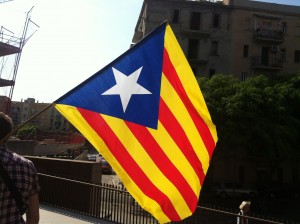It’s rarely advisable for a foreigner to wade into national political debate. Whatever your thoughts were on Mitt Romney or Barack Obama during the US Presidential election, they were best kept within earshot of fellow Europeans. Americans don’t take too kindly to know-it-alls from across the Pond telling them how they should vote. And that’s fair enough.
It’s a similar situation in Spain. Despite shared EU interests, you’re likely to be met with a polite ‘thanks for your opinion’ the first time you attempt to engage in politics in Spain as a ‘guiri’ (foreigner). The second time, the response is likely to be less restrained.
But the forthcoming Catalan election on Sunday, November 25, is different. While rooted in and of the people of Spain, it’s an election that could have wider ramifications for the rest of Europe. Hence, outsiders’ opinions are not just tolerated, but – for the millions of Catalans straining at the secession leash – they’re welcomed.
The Catalans’ stance is well known. Their quest for independence from Spain has never quite taken the dark turns as that of ETA-led Basque Country, but the fervour and vitriol of the people is perhaps even more stringent than that of their northern neighbours. While ETA’s acts of bloodshed and terrorism have often turned the average voter against them, the Catalans’ careful politicising and – yes – success of its all-conquering Barcelona FC have led many to wonder whether they should go it alone.
They have done before, of course. Catalans are a proud people with a rich history, culture and language. Increasingly, however, they look on Spain’s current economic woes as not their problem. In the local press, supporters of independence cite a variety of statistics and findings arguing were Catalonia to become independent it would be far wealthier than currently.
It’s true that Catalans are taxed more highly than many other Spaniards, and that much of the expenditure on infrastructure has been in other, less developed areas. That’s how nations work – by redistributing wealth and opportunity. But if Catalans don’t see themselves as Spanish, it’s a recipe for unrest.
On Sunday, the local election has been called in response to a demonstration on September 11, calling for Catalan independence. Nothing will be decided this weekend but the outcome could pave the way for a future referendum on Catalan independence.
Why is this important?
The Catalans are not the only, and certainly weren’t the first, peoples of Europe dissatisfied with current sovereignty. But they are perhaps closest to securing an outcome on their terms. This is important for the rest of Europe because, should they succeed, then other regions will perhaps try to follow suit – Bavaria in Germany; the Lega Nord in Italy; and various other parts of Spain, including Basque Country. In the UK, Scotland is due a referendum on its independence in 2014.
For Spain, this is an issue that the government is treating carefully. There are strong arguments on both sides of the divide, and everything has been brought into sharp focus because of the ongoing recession. Money talks, and is a huge factor here. So it will be interesting to see who comes out on top on Sunday.
 en
en




 Vlaams-Nederlands
Vlaams-Nederlands
1 Comment
Leave a Comment
DISCLAIMER
The opinions and comments expressed by contributors to this Blog are theirs alone and do not necessarily reflect the views of VIVA Homes Under the Sun Ltd, any of its associated companies, or employees; nor is VIVA to be held responsible or accountable for the accuracy of any of the information supplied.
Christopher Russell GoodallNovember 26, 2012 at 12:50 pm
The Catalan governmont doesn’t do much to help it’s cause by only communicating with people in Catalan and obligating them to speak the language. Their attitude is the reverse of what happened under Franco’s regime. Our family personally had experience of this and all official letters came to Málaga in Catalan, even though the national language is Spanish. You only manage to antagonise people by trying to force them down a certain route. As a British-Spaniard with both Andalucian and Catalunian family, I hear this an awful lot. They should take a leaf out of Wales’ book. The official language in Wales (at least in the North) is Welsh but all official government communications are in both languages as they realise that not everyone speaks Welsh, nor should they, especially since they depend a lot on tourism. To work for the council in North wales you have to speak both Welsh AND English.
It’s such a shame that everyone is crying out for independance these days when we should all try and just get along with each other for the greater good and show a spirit of cooperation!
Have you got something to say?